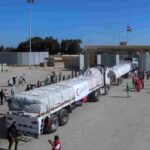Former Pakistan prime minister Imran Khan was arrested by paramilitary forces, in a move that Pakistan’s Supreme Court has now described as illegal. Ever since a no-confidence vote removed Khan from power, the public has lost trust in Pakistan’s military. Such widespread rage against the military, however, is nothing new in Pakistan.
Parts of Pakistan’s southwestern province of Balochistan have always had an uneasy relationship with the military. Pakistan’s tribal areas have also taken a dim view to military presence in their region. This led to the formation of the Pashtun Tahaffuz Movement (PTM) in 2016, a movement for the human rights of tribal Pashtuns who live in that region and are openly critical of the military. These were largely considered peripheral groups outside of mainstream Pakistan.
Now, however, with Khan’s arrest there have been protests in cities including Lahore, Rawalpindi, and Peshawar. These cities have historically supported the military. Khan’s arrest could well be a turning point in Pakistani politics. Rising dissent from Pakistanis from a range of backgrounds has been made prominent with the targeting of military installations in these cities. It also appears that this dissent has changed the public view of the military.
Imran Khan’s arrest
The manner in which Khan was arrested, inside court premises in Islamabad, has been fiercely criticised. Authorities have since revealed that his arrest is related to corruption allegations in the Al-Qadir Trust case.
According to Pakistan’s National Accountability Bureau (NAB), property tycoon Malik Riaz gave land worth billions of rupees to the Al-Qadir Trust. The trust said the land was for building a new university. However, Khan and his wife Bushra Bibi are the sole proprietors of the Trust, and the university remains unbuilt. Firstpost explained how the alleged bribe worked:
The government said the scheme originated with 190 million pounds repatriated to Pakistan in 2019 by Britain after Hussain forfeited cash and assets to settle a British probe into whether they were proceeds of crime.
Instead of putting it in Pakistan’s treasury, Khan’s government used the money to pay fines levied by a court against Hussain for illegal acquisition of government lands at below-market value for development in Karachi.
The interior minister alleged Hussain gave the land to Khan through the Al-Qadir Trust in exchange for that favour.
Khan’s arrest came shortly after he mentioned a senior military official by name and accused the official of planning to assassinate him. Khan has repeatedly made this claim, although Pakistan’s military has denied the allegations.
Criticism of the military
A long-running irony of Pakistan’s politics is that the opposition has often criticised the military establishment but, when in power, then works with the military to govern. Khan was no exception to this rule.
Khan’s government approved a bill that made it illegal to criticise Pakistan’s military, despite widespread backlash. And as a result, journalists, activists, and other opponents were either arrested or abducted.
For example, police arrested Pakistani journalist Bilal Farooqi in September 2020 for defaming the military. Unknown perpetrators abducted another journalist, Matiullah Jan, in July 2020 without any explanation. Jan had been a vocal critic of the military. Meanwhile, police arrested PTM activists in January 2020 during a rally for another arrested human rights activist.
Moreover, analysts and political figures in Pakistan alleged that Khan assumed the post of PM with the military’s help. During his tenure, Khan said that he had a good relationship with the military. But, after the no-confidence vote against Khan in April 2022 and his removal from office, Khan has become critical of the military.
A black chapter?
The outrage that ensued after Khan’s arrest confirms just how popular a leader he is. Khan’s ousting from power has led to the military becoming increasingly unpopular, even among regions where it once enjoyed support. The military is visibly frustrated at the damage the issue has caused to its reputation.
In the past, support from privileged sections of society meant the military was largely free to behave as it pleased. However, growing anger has spread even to these privileged sections. The anger at the current protests is palpable, and public trust in the military will be hard to repair.
The military has termed these days of unrest a “black chapter” in Pakistan’s history. It’s difficult to say whether the loss of support will lead to a restructure of how it works with elected governments in Pakistan, or if it will completely remove itself from political affairs in the future. If the reaction to the arrest has shown anything, it’s that the people of Pakistan are not likely to allow the military the impunity it has previously enjoyed.
As for Khan, the reactions to his arrest have shown that his star power maintains a stronghold on the public. However, if he takes up office again, how will he navigate the historical power that the military holds in Pakistan?
Moreover, will this saga lead Khan to be more receptive of criticism of the military’s power, now that he has been on the receiving end? Or will he choose to get into bed with them again in pursuit of mutual interests? As answers to these questions unfold, we may yet see a shift in the power dynamics of Pakistan’s highest governing institutions.
Featured image by Wikimedia Commons/Financial Times – via CC 2.0, resized to 1910×1000
















